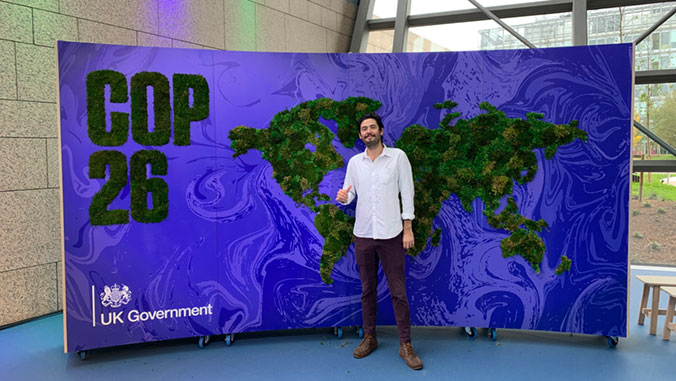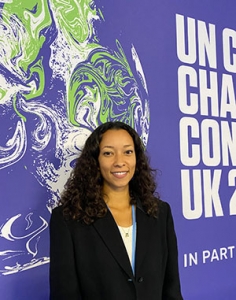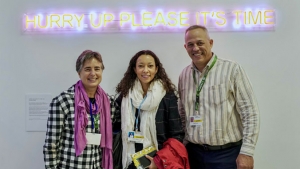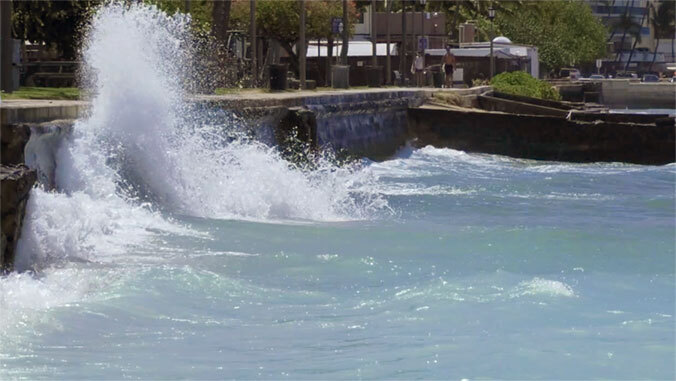
Students at the University of Hawaiʻi at Mānoa met thought leaders and change makers at the United Nations Climate Change Conference (COP26) including environmental activists, lawyers, scientists, UN ambassadors and more. From the School of Ocean and Earth Science and Technology and William S. Richardson School of Law, faculty and students traveled to Glasgow as an official observer delegation to COP26 from October 31 to November 12.
Naima Te Maile, a second-year law student, attended the first week of the conference, and Joe Udell, a third-year law student, attended the second week of the conference. With COVID-19 protocols each room had limited attendance, so students planned out sessions that they wanted to attend.
“It’s important that the University of Hawaiʻi sent a delegation to COP26 because it represents UH’s commitment to being actively involved and represented in spaces where climate change and the future and well-being of all humanity is being negotiated and discussed. I also believe that I was in a better position, as an environmental law student, to learn exactly how I could best ‘pay it forward,’” said Te Maile.

Te Maile observed an intimate roundtable briefing with UH law Professor and Senior Advisor with the Office of the Special Presidential Envoy for Climate Maxine Burkett, Secretary Deb Haaland (the first Native American to serve as a cabinet secretary) and U.S. tribal leaders who were attending COP26. It was moderated by Jonathan Pershing (deputy special envoy for climate at the U.S. Department of State), who noted, in response to participants’ concerns about accessibility to COP26 and the environmental degradation they were seeing in their home states, “Trust in the system is going down while urgency is going up.”
A recurring question at COP26 was how more Indigenous youth could engage in future conferences and have a more active role in the decision-making processes. There were multiple calls across various sessions for more communication and collaboration between environmental law and climate science.
“In attending COP26 my goal was to connect with and learn from Pacific Island delegations, especially Tuvalu, that were intent on spreading a message of urgency about the climate crisis,” said Te Maile. “Most of the programs I attended were centered on amplifying Indigenous voices and underlined the need for greater accessibility to spaces like COP26, and greater representation and platforms for Indigenous peoples’ voices to be heard.”
- Related UH News story: UH students, faculty to attend UN climate change convention, October 28, 2021
Hawaiʻi’s role at COP26
Hawaiʻi, as a U.S. state that is also situated in the heart of the Pacific with Oceania roots and a significant Pacific Islander population, is in a unique position to influence the U.S. by calling for more federally enforced environmental protection and more support for Pacific Island neighbors who are also facing the effects of climate change.
“There’s no question that the highlight of my trip was listening to President Obama speak at a small event about island resilience,” said Udell. “That was actually the very first session that I attended at COP26. It was just a special moment to be in Glasgow, representing the University of Hawaiʻi, and listening to President Obama talk about how he has been shaped by his own experiences growing up in Hawaiʻi.”
UH’s significant role

Centers of learning are integral in the fight against climate change and, through its delegation, UH was able to share the work of faculty, administrators and students with people from around the world. Those conversations informed others and will contribute to the university’s own institutional knowledge of climate change, its classroom instruction and future scholarship.
Denise Antolini, a UH law professor, commented “We are so proud of Joe and Naima for making this extraordinary journey to attend COP26. They wasted no time in networking 24/7 with other youth leaders, Pacific Island networks, policymakers, lawyers and scientists, immersing themselves in this complex global meeting. They embody our hope for a climate-safe future for Hawaiʻi and the world.”
UH law school Environmental Law Program faculty members David Forman, Richard Wallsgrove and Antolini worked together to obtain official credentials for the students, help them find funding, and network at myriad events in Glasgow.
“There is no shortage of work needed to protect Hawaiʻi and the Indigenous communities that are disproportionately affected by the effects of climate change,” said Udell. “UH can play a significant role in that process, and I look forward to taking the knowledge that I have gained in Glasgow and being an active participant in those climate efforts.”
“As an environmental law student, I appreciated being able to see how much faith and trust people and governments still had in the law in being able to protect the most vulnerable—even though how this could happen is far from straightforward. Attending COP26 as a UH delegate enabled me to realistically assess how engaged Hawaiʻi is in the climate change problem, how much the Hawaiʻi community is meaningfully contributing to solutions and research, and ‘showing up’ in spaces where critical decisions related to environmental sustainability and justice are being made,” said Te Maile.
This event is an example of UH Mānoa’s goal of Building a Sustainable and Resilient Campus Environment: Within the Global Sustainability and Climate Resilience Movement (PDF) and Enhancing Student Success (PDF), two of four goals identified in the 2015–25 Strategic Plan (PDF), updated in December 2020.


